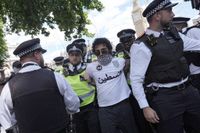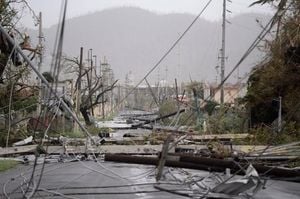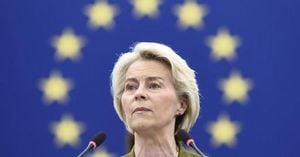On August 17, 2025, the United Kingdom found itself at the heart of a heated debate over the boundaries of protest, civil liberties, and national security. The government’s recent decision to proscribe Palestine Action as a terrorist organization has ignited controversy, with supporters and critics alike weighing in on the implications for democracy and public safety.
Home Secretary Yvette Cooper, writing in The Observer, defended the government’s move, stating that Palestine Action was "more than a regular protest group." She emphasized, "Protest and free speech remain an important part of our democracy and will always be protected," but argued that the group had engaged in an "escalating campaign" that crossed the line from lawful protest into violent criminality. According to Cooper, counterterrorism intelligence revealed "disturbing information" about future attacks, leading the organization to meet the criteria for proscription under the 2000 Terrorism Act.
"Protecting public safety and national security are at the very heart of the job I do," Cooper wrote. "Were there to be further serious attacks or injuries, the government would rightly be condemned for not acting sooner to keep people safe." She was careful to distinguish between the broader movement for Palestinian rights and the actions of Palestine Action, noting that "only a tiny minority of people who had protested in support of Palestinian people since the start of the war with Israel had been arrested." She added, "That is why the proscription of this group is not about protest or the Palestinian cause. In a democracy, lawful protest is a fundamental right but violent criminality is not."
The decision to proscribe Palestine Action came in the wake of a high-profile incident: the vandalism of two Voyager military aircraft at RAF Brize Norton in Oxfordshire on June 20, 2025. In response, the government officially banned the group on July 5, 2025. This move made membership of, or support for, Palestine Action a criminal offence—one punishable by up to 14 years in prison.
The aftermath of the ban was immediate and dramatic. The Metropolitan Police reported that, since July 5, more than 700 people had been arrested in connection with Palestine Action. The force confirmed the first three charges under the Terrorism Act relating to the group, following arrests at a protest in Parliament Square on the day of the ban. More prosecutions are expected in the coming weeks, with the Met stating that arrangements are in place to "investigate and prosecute significant numbers each week if necessary." Norfolk Police, for their part, arrested 13 people at a protest in Norwich as recently as August 16.
The crackdown has not been confined to England. In Scotland, the issue has taken on a distinctly local flavor. Thousands of pro-Palestinian protesters marched through Edinburgh on July 19, 2025. Police later confirmed that two men were arrested under the Terrorism Act 2000 for showing support for a proscribed organization, with a third arrest made near the Scottish Parliament two days later.
The most recent and striking episode unfolded at a protest march in London last weekend, where demonstrators carried placards declaring "I support Palestine Action." According to Edinburgh News, 522 people were arrested on suspicion of breaking terrorism laws related to the group. The demographic details of those arrested raised eyebrows: the average age was 54, and 112 of them were over 70. Images circulated widely of elderly protesters being led away by police, including an 89-year-old, sparking public debate about the proportionality of law enforcement’s response.
The scale and nature of the arrests have prompted sharp criticism from some quarters. Edinburgh MSP Alex Cole-Hamilton voiced his concerns, warning of a "massive" potential waste of police time that could be better spent tackling violent and antisocial offenders. "Proscription must be applied carefully and proportionately, or we risk undermining public trust and civil liberties. The right to peaceful protest is a cornerstone of a liberal democracy," he said. Cole-Hamilton continued, "It has clearly been incredibly uncomfortable for police officers to be asked to arrest peaceful demonstrators. This sets a dangerous precedent and risks a chilling impact on free speech and legitimate protest. It cannot be right that elderly members of groups like Palestine Action are placed in the same legal category as ISIS."
He also called for an urgent review of terrorism legislation to ensure it is both proportionate and nuanced. "Serious criminal offences such as vandalism of military equipment and RAF aircraft deserve accountability under the law, but these powers should be reserved for tackling those who endanger the UK's defence and security, rather than for heavy handedly removing protesting pensioners from public spaces," Cole-Hamilton argued. He suggested that if similar protests spread to Scotland, it could lead to "a massive waste of time when officers and court officials would be better off tackling violent and antisocial offenders."
In a letter to Police Scotland Chief Constable Jo Farrell, Cole-Hamilton pressed for clarity on how the force would approach such protests if they were to occur north of the border. "Obviously, I would not expect you to involve yourself in the debate around proscription per se but I hope you might agree with me that it does raise legitimate questions of balance around policing protests involving those who have taken a different view from the one reached by the Home Secretary," he wrote. Cole-Hamilton also argued that it "can only hinder the fight against terror" if the law is perceived as targeting "people whose intention is to exercise their constitutional rights to protest." He concluded, "I’m keen to understand how Police Scotland intends to navigate the tension that exists here between free speech, policing by consent and the demands of this legislation."
The controversy has also reignited broader discussions about the balance between security and civil liberties in the UK. Supporters of the government’s measures argue that decisive action is needed to prevent future attacks and protect national security. Detractors, however, warn of the dangers of overreach, the erosion of public trust, and the chilling effect on peaceful protest. The images of elderly demonstrators being arrested have become a rallying point for those who believe the government’s approach is too heavy-handed.
As the situation continues to evolve, all eyes are on how law enforcement agencies—especially in Scotland—will respond to future demonstrations. The debate over Palestine Action’s proscription has exposed deep fault lines in British society over the meaning of protest, the limits of state power, and the enduring importance of civil liberties.
In the coming weeks, as more prosecutions are pursued and police forces across the country face mounting scrutiny, the UK will be forced to grapple with these fundamental questions. The outcome of this debate could have far-reaching consequences for the country’s approach to protest, policing, and the delicate balance between security and freedom.




